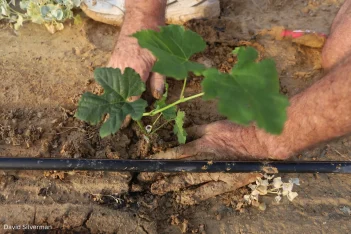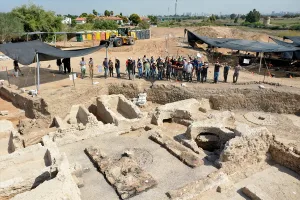Israel is famous for its agriculture. Israeli farmers are leaders in innovations and new technology, always pushing the frontiers of knowledge and challenging existing pre-conceptions. This technology and drive is also present amongst the country’s wine growers.
Israeli vineyards tend to be in an ongoing battle with the elements. On one side there is a chronic lack of water and what there is can be very expensive. Israel’s once proud citrus industry is a shadow of what it once was as the country has reverted to hi-tec instead of agriculture. However vineyards use less water than many other fruit crops. This has been a significant factor in the decision by farmers to plant new vineyards.
Secondly, Israel in terms of sun hours is like North Africa. The coastal area can be hot and humid. The main vineyards of Israel lie at a latitude between 31.5 to just over 33 o N.
This why many of the newer vineyards are at higher altitudes where temperatures are cooler, allowing a longer growing season. The fastest growing regions in terms of new vineyards being planted are the Judean Foothills, Judean Hills, Upper Galilee and Golan Heights. Many of these vineyards rise from 400 meters to up to 1,000 meters above sea level.
However the Israeli sun and combination of hills and mountainous areas with soils of limestone, terra rossa and volcanic tuff, make this small country a winemaking paradise.
Due to the total lack of rain during the growing season, drip feed irrigation is essential. This was pioneered by the Israelis in the early 1960’s and is now used in agriculture all over the world. Precipitation is therefore is not important for the vine’s growth, but rainwater absorption in the soil is important as are the storage reservoirs, which need to be filled by the winter rains.
The preferred aspect of an Israeli vineyard is a north facing slope with vines planted east to west. The cooling Mediterranean winds from the west, are then able to penetrate the rows of vines. This has a cooling effect, provides ventilation, which reduces humidity and brings down average temperatures.
Most vineyards planted in the last twenty years conform to a standard. There are 1.5 meters between vines and 3 meters between rows. The usual vineyard density is 2,220 vines per hectare. There is a distinct preference for mechanical harvesting. This means a vineyard may be night harvested in a few hours, at the optimum time, and brought to the winery in the cool temperatures of the early morning.
Canopy management is crucial in a hot country like Israel. It is important to reduce the vigor of the vines, but protect the grapes from over exposure. The objective is to let the light in, but provide protection from the sun. Most vineyards are cordon spur pruned in a VSP – vertical shoot position.
However some of the older vineyards are planted in the goblet, bush vine format. In the Judean Hills some of the vineyards are planted in stone lined terraces. Some of the older vineyards don’t need irrigation. The roots of the vines have dug deep into the stony soil over the years, to receive the water required. These vines are hand harvested.
Bud break is normally from the beginning to mid March and flowering in the two weeks in the middle of April. The main hazard is not frost or hail in the spring, or rain during the harvest, but the dreaded hamsin. These are warm winds that come from the Arabian Desert in the south east, drastically raising temperatures, sometimes up to 40 o C. The vines simply close down in order to survive.
Another unfortunate hazard unique to this area, is war. In 2006 when rockets rained into the Galilee in the Second Lebanon War, winemakers were not able to enter the vineyards in the crucial six weeks before harvest. Fortunately there was a ceasefire in time to save the harvest in the Upper Galilee.
Harvesting usually starts in mid to late July. The muscats and white grapes used for making sparkling wines are the first to be harvested. However the bulk of the harvest is from August, September to the early part of October. In a few instances the last Cabernet Sauvignon grapes in the northern Golan Heights may be harvested even in the first week of November. So Israel has a very long harvest period.
The most technically advanced viticulture is practiced on the Golan Heights by Yarden. Here there are meteorological stations strategically placed in the vineyards providing information on leaf wetness, soil temperature, humidity, temperature reporting back to the winery by the second. This is where technology and agriculture meet to provide the viticulturists with the maximum information possible.
Israelis are always keen to throw convention aside and attempt the impossible. Carmel were the pioneers in the Negev Desert planting vineyards at Ramat Arad. This was the perfect example of ‘making the desert bloom’. Since there have been experiments in growing vineyards in the deeper Negev, particularly at Mitzpe Ramon and Sde Boker. In one instance, saline water was drawn from deep, ancient, underground wells more than 650 meters below ground. Other, more successful experiments have involved the use of treated sewage water from a nearby army base. Israeli efforts to grow wine grapes in the desert are being watched with interest by other hot wine producing countries.
The only winery in Israel producing organic wine has unfortunately closed. There are though a number of wineries producing wine from organically grown vineyards.
The concept of organic or self sustainable vineyards is a growing trend in Israel.
Adam Montefiore works for Carmel Winery and regularly writes about wine in both Israeli and international publications.


















